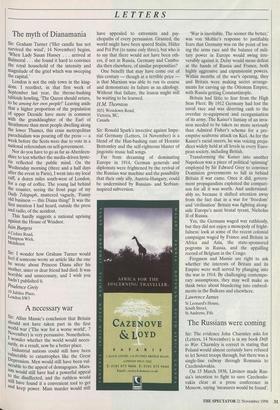Sir: Ronald Spark's invective against Impe- rial Germany (Letters, 14
November) is a blend of the Hun-bashing rant of Horatio Bottomley and the self-righteous bluster of jingoistic music hall songs.
Far from dreaming of dominating Europe in 1914, German generals and diplomats were frightened by the revival of the Russian war machine and the possibility that their only ally, Austria-Hungary, could be undermined by Russian- and Serbian- inspired subversion. `War is inevitable. The sooner the better,' was von Moltke's response to justifiable fears that Germany was on the point of los- ing the arms race and the balance of mili- tary power in Europe would swing irre- versibly against it. Delay would mean defeat at the hands of Russia and France, both highly aggressive and expansionist powers. Within months of the war's opening, they and Britain were making secret arrange- ments for carving up the Ottoman Empire, with Russia getting Constantinople.
Britain had little to fear from the High Seas Fleet. By 1912 Germany had lost the naval race and was diverting cash to the overdue re-equipment and reorganisation of its army. The Kaiser's fantasy of an inva- sion needed to be taken no more seriously than Admiral Fisher's scheme for a pre- emptive seaborne attack on Kiel. As for the Kaiser's racial sneers, he was voicing preju- dices widely held at all levels in every Euro- pean society, including British.
Transforming the Kaiser into another Napoleon was a piece of political 'spinning' employed by Sir Edward Grey to convince Dominion governments to fall in behind Britain if war came. Once it did, govern- ment propagandists exploited the compari- son for all it was worth. And understand- ably so, because it shifted attention away from the fact that in a war for 'freedom' and 'civilisation' Britain was fighting along- side Europe's most brutal tyrant, Nicholas II of Russia.
Yes, the Germans waged war ruthlessly, but they did not enjoy a monopoly of fright- fulness: look at some of the recent colonial campaigns waged by France and Britain in Africa and Asia, the state-sponsored pogroms in Russia, and the appalling record of Belgium in the Congo.
Ferguson and Massie are right to ask whether the interests of Britain and its Empire were well served by plunging into the war in 1914. By challenging contempo- rary assumptions, they may well make us think twice about blundering into embroil- ments in the Balkans and elsewhere.
Lawrence James
St Leonard's House, South Street, St Andrews, Fife


















































































 Previous page
Previous page